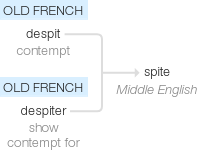Spite
Middle English: shortening of Old French despit ‘contempt’, despiter ‘show contempt for’.
wiktionary
From a shortening of Middle English despit, from Old French despit (whence despite), from Latin dēspectum(“looking down on”), from Latin dēspiciō(“to look down, despise”). Compare also Dutch spijt.
(This etymology is missing or incomplete. Please add to it, or discuss it at the Etymology scriptorium.)
etymonline
spite (n.)
c. 1300, shortened form of despit "malice" (see despite). Corresponding to Middle Dutch spijt, Middle Low German spyt, Middle Swedish spit. In 17c. commonly spelled spight. Phrase in spite of is recorded from c. 1400, literally "in defiance or contempt of," hence "notwithstanding." Spite-fence "barrier erected to cause annoyance" is from 1889.
spite (v.)
c. 1400, "dislike, regard with ill will," from spite (n.). Meaning "treat maliciously" is from 1590s (as in "cut off (one's) nose to spite (one's) face"); earlier "fill with vexation, offend" (1560s). Related: Spited; spiting.
